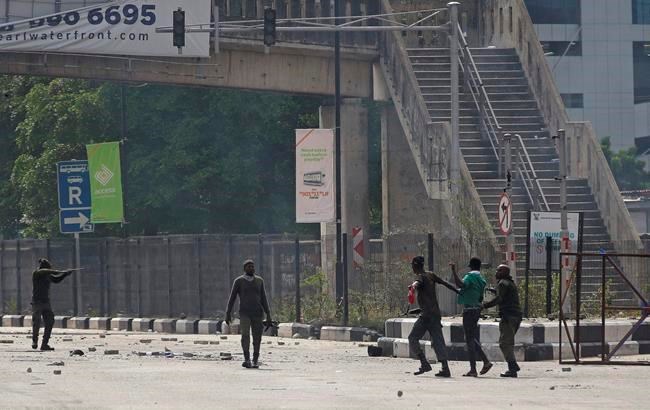LAGOS, Nigeria — Amnesty International said in a report Wednesday that Nigeria's security forces fired upon two large gatherings of peaceful protesters Tuesday night, killing 12 people calling for an end to police brutality.
At least 56 people have died during two weeks of widespread demonstrations against police violence, including 38 on Tuesday, the group said. The Nigerian government did not immediately comment about Amnesty International's allegations.
The #EndSARS protests began amid calls for Nigeria's government to close the police Special Anti-Robbery Squad, known as SARS, but has become a much wider demand for better governance in Nigeria.
Despite the growing violence, the Nigerian protesters defied a curfew and faced off with security forces Wednesday as gunfire rang out and fires burned in Lagos, a day after shots were fired into a crowd of demonstrators singing the country’s national anthem.
The security forces opened fire without warning on the protesters Tuesday night at the Lekki toll plaza, Amnesty said in its report, citing eyewitnesses, video footage and hospital reports.
“Opening fire on peaceful protesters is a blatant violation of people’s rights to life, dignity, freedom of expression and peaceful assembly. Soldiers clearly had one intention - to kill without consequences,” said Osai Ojigho, country director of Amnesty International Nigeria.
Amnesty said it has received reports that shortly before the shootings, CCTV security cameras at the Lekki toll gates, where protesters had been camped for two weeks, were removed by government officials and electricity was cut to prevent evidence emerging of the violence.
Some of those killed and injured at the toll plaza and in Alausa, another Lagos
“These shootings clearly amount to extrajudicial executions. There must be an immediate investigation and suspected perpetrators must be held accountable through fair trials,” said Ojigho.
Amnesty's report backs up posts and images on social media that have shown widespread violence against protesters.
Amid global outrage, Nigeria’s military denied responsibility for the Lekki shootings, posting a tweet that labeled several reports as fake news.
More gunfire rang out across Lagos on Wednesday and into the night, including at the Lekki toll plaza, where young demonstrators rallied again despite an order for everyone to stay off the streets. At the sound of the shots, some protesters were seen on a live broadcast by The Associated Press running away, though it wasn’t clear if the crowd was fired upon.
Police also fired tear gas at bands of demonstrators and smoke was seen billowing from several areas in the city’s
“People are aggrieved over the deaths. They are aggrieved by police violence and they are going out on the streets to show their anger,” said Lagos resident Michael Oladapo Abiodun, who said he has supported protesters on social media.
Demonstrations and gunfire were also reported in several other Nigerian cities, including the capital city, Abuja.
In response to the #EndSARS movement, the government announced it would disband the unit, which Amnesty International says has been responsible for many cases of torture and killings.
That has failed to satisfy demonstrators, who now demand more widespread reforms to end human rights abuses committed by security forces and pervasive government corruption.
Nigeria has massive oil wealth and is one of Africa’s largest economies, but many of its more than 200 million people face high poverty levels and lack basic services — because of rampant graft, according to rights groups.
The protests drew increased international attention after videos were posted on social media in which gunfire was heard echoing over protesters as they sang the national anthem at the Lekki toll plaza in the darkness Tuesday night.
It’s not clear in the videos who was firing, but many agree with the Amnesty report that Nigeria’s military is responsible. U.N. High Commissioner for Human Rights Michelle Bachelet said “there is little doubt that this was a case of excessive use of force, resulting in unlawful killings with live ammunition, by Nigerian armed forces.”
Lagos governor Obajide Sanwo-Olu has ordered an investigation into the military's actions at Lekki plaza. He said that 25 people were injured and one person had died from blunt trauma to the head.
President Muhammadu Buhari — who has said little about the protests engulfing his country — did not mention the Lekki shootings in a statement Wednesday but issued a call for calm and vowed police reforms.
Buhari’s statement said the dissolution of the SARS unit “is the first step in a set of reform policies that will deliver a police system accountable to the Nigerian people.”
U.N. Secretary-General Antonio Guterres told The Associated Press in an interview Wednesday that the right of Nigerians "to protest peacefully needs to be guaranteed.”
He said “police brutality needs to stop, and those responsible for acts of such dramatic violence are made accountable.”
Guterres said he spoke with Buhari several days ago and believes he “will be able to bring things into a normal way to respect the rights of assembly of people, and to make sure that those that misbehaved are held accountable.”
Nigeria’s violence has also drawn denunciations by foreign dignitaries and celebrities ranging from U.S. presidential candidate Joe Biden to Beyoncé.
___
Associated Press journalists Bashir Adigun in Abuja, Nigeria, and Andrew Meldrum in Johannesburg, contributed.
Sam Olukoya And Lekan Oyekanmi, The Associated Press



